“The unusual and tragic career of Leon Fleisher has always been one of the great classical-music mysteries of the age. Widely regarded in the 1950s and 1960s as this country’s finest native-born classical pianist, Fleisher stopped appearing in concerts in 1965 when a then-inexplicable nervous-system disorder left him unable to play with his right hand…”
Archives for 2011
TT: A little taste
Earlier today I posted about the foreword that I’m writing for the University of Chicago Press’ upcoming uniform-edition versions of Flashfire and Firebreak, two novels about Parker, the professional criminal, that were written by Donald E. Westlake under the pseudonym of Richard Stark. I sent the finished foreword off to Chicago this morning. Here are the last two paragraphs.
* * *
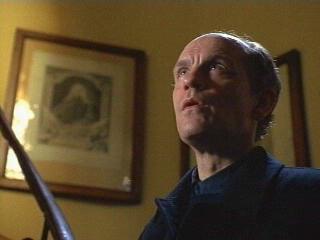 When I first started reading about Parker, I thought of the words of Dostoevsky’s Ivan Karamazov: “If you were to destroy in humanity the belief in its immortality, not only love but every vital force for the continuation of earthly life would at once dry up. Moreover, then nothing would be immoral any more, everything would be permitted, even cannibalism.” Up to a point, that applies to Parker, a man to whom nothing but amateurishness is immoral. Even more to the point, though, is Liliana Cavani’s 2002 film version of Ripley’s Game, in which these words are put into the mouth of Tom Ripley, Patricia Highsmith’s anti-hero: “I lack your conscience and when I was young that troubled me. It no longer does. I don’t worry about being caught because I don’t believe anyone is watching.”
When I first started reading about Parker, I thought of the words of Dostoevsky’s Ivan Karamazov: “If you were to destroy in humanity the belief in its immortality, not only love but every vital force for the continuation of earthly life would at once dry up. Moreover, then nothing would be immoral any more, everything would be permitted, even cannibalism.” Up to a point, that applies to Parker, a man to whom nothing but amateurishness is immoral. Even more to the point, though, is Liliana Cavani’s 2002 film version of Ripley’s Game, in which these words are put into the mouth of Tom Ripley, Patricia Highsmith’s anti-hero: “I lack your conscience and when I was young that troubled me. It no longer does. I don’t worry about being caught because I don’t believe anyone is watching.”
Like Ripley, who is a real sociopath, Parker has no conscience. Somehow, though, I doubt that has ever troubled him. I think he got up one morning, decided for reasons known only to himself that no one was watching except for the cops, and decided to act accordingly. Nor do I think there was anything dramatic about his decision, no Farewell remorse…evil be thou my good moment to stun the groundlings. And that’s what makes Parker so interesting, so seductive, and so wholly unlike most of the rest of us: he just doesn’t care, and never did.
TT: I’ll work it in somewhere
In addition to presenting my first play tonight at Rollins College in Florida, I have to write and file two Wall Street Journal columns before flying up to New York on Saturday morning to see a press preview of Pete Gurney’s new play. I’m also working on the fourth chapter of Black Beauty: A Life of Duke Ellington, which is about two thousand words away from being done. I just started writing a description of the Cotton Club, the mob-owned Harlem nightspot where Ellington and his band took up residency in 1927, and the kitchen table of our borrowed Florida condo is piled high with all sorts of relevant books.
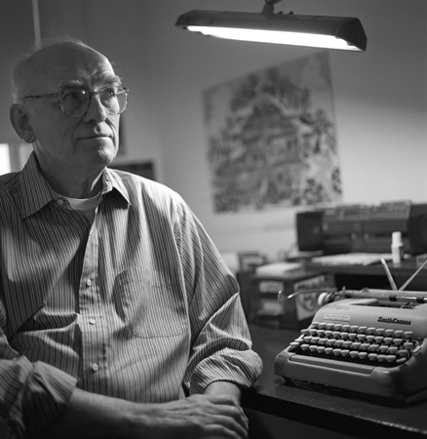 That is, needless to say, plenty to do, but I also want to knock out yet another piece this week. The University of Chicago Press has asked me to write a preface for Flashfire and Firebreak, two of the upcoming volumes in its uniform edition of the Parker novels. Regular readers of this blog will know what and whom I’m talking about, but for those of you just joining us, Parker is the professional thief about whom Donald E. Westlake published twenty-four novels under the pseudonym of “Richard Stark” between 1962 and his death in 2008. Several of them were turned into films of widely varying quality, the best remembered of which is John Boorman’s Point Blank, in which Lee Marvin played Parker.
That is, needless to say, plenty to do, but I also want to knock out yet another piece this week. The University of Chicago Press has asked me to write a preface for Flashfire and Firebreak, two of the upcoming volumes in its uniform edition of the Parker novels. Regular readers of this blog will know what and whom I’m talking about, but for those of you just joining us, Parker is the professional thief about whom Donald E. Westlake published twenty-four novels under the pseudonym of “Richard Stark” between 1962 and his death in 2008. Several of them were turned into films of widely varying quality, the best remembered of which is John Boorman’s Point Blank, in which Lee Marvin played Parker.
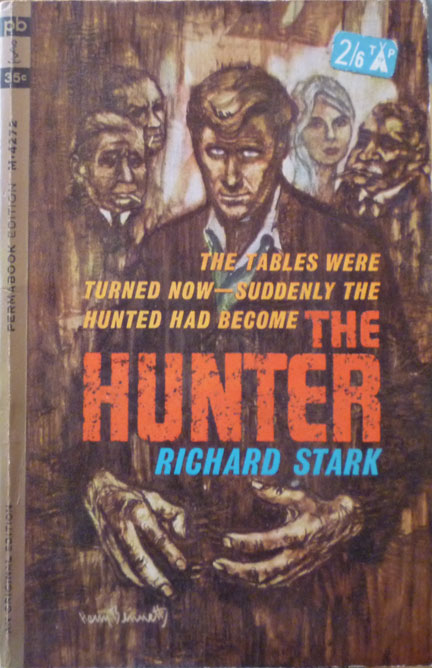 The books themselves were long known only to the most assiduous of mystery buffs, in part because many of them were originally published as paperback originals, and it took years for them to find a wider following. Today, though, the Parker novels are now regarded as classics of their genre, and the University of Chicago Press is currently in the process of reprinting them all in batches of two or three. Each batch features a preface written by a longtime admirer of Westlake’s work, and I’ve been tapped to supply one for Flashfire and Firebreak.
The books themselves were long known only to the most assiduous of mystery buffs, in part because many of them were originally published as paperback originals, and it took years for them to find a wider following. Today, though, the Parker novels are now regarded as classics of their genre, and the University of Chicago Press is currently in the process of reprinting them all in batches of two or three. Each batch features a preface written by a longtime admirer of Westlake’s work, and I’ve been tapped to supply one for Flashfire and Firebreak.
The piece is due next Tuesday, but I want to try to get it into the can before going to New York. I have a birthday coming up on Sunday and Mrs. T follows suit next Thursday, and we’d really like to kick back and relax, so I started drafting my essay yesterday morning and hope to wrap it up and send it off some time tomorrow.
And why am I telling you all this? Because I’m bragging. My admiration for Westlake is extravagant–it was one of the not-so-minor disappointments of my life that I never got to meet him–and I consider it a great honor to have been asked to write about his Parker novels for the uniform edition. I’ve only written two such retrospective prefaces in the past, for new editions of Elaine Dundy’s The Dud Avocado and Paul Taylor’s Private Domain: An Autobiography. I think this assignment ranks right up there, don’t you?
TT: Almanac
“Of all tyrannies, a tyranny sincerely exercised for the good of its victims may be the most oppressive. It would be better to live under robber barons than under omnipotent moral busybodies. The robber baron’s cruelty may sometimes sleep, his cupidity may at some point be satiated; but those who torment us for our own good will torment us without end for they do so with the approval of their own conscience.”
C.S. Lewis, God in the Dock
TT: She stumbled when she saw
In the Greater New York section of today’s Wall Street Journal, I review the Irish Repertory Theatre’s off-Broadway revival of Brian Friel’s Molly Sweeney. Here’s an excerpt.
* * *
Why is is that American productions of the works of Brian Friel, the greatest playwright of the English-speaking world, are so hard to come by? It’s been two years since I last saw one, which is far too long. So it is good news indeed that the Irish Repertory Theatre, my favorite Off-Broadway company, is performing “Molly Sweeney,” a three-person show about a 41-year-old woman who undergoes an operation to regain the sight she lost as a baby. “Molly Sweeney” is one of Mr. Friel’s most remarkable plays, yet it hasn’t been presented in New York since 1996, which I find even harder to fathom. Fortunately, this revival, staged by Charlotte Moore, the company’s artistic director, is immensely persuasive, and I have no doubt that anyone who sees it will be converted on the spot to Mr. Friel’s cause.
 “Molly Sweeney” is a three-person play constructed along the same “Rashomon”-like lines as Mr. Friel’s “Faith Healer,” in which the characters speak to the audience but not to one another, telling their collective tale from their own sharply different perspectives. The personalities here are no less varied. Molly (Geraldine Hughes) is a strong, serene woman who long ago came to terms with her disability and now fears–with good reason–the unknowable consequences of regaining her sight. Her husband Frank (Ciarán O’Reilly) is a garrulous ne’er-do-well who sees in Molly’s operation the possibility that his own life will be changed, only for the better. And Mr. Rice (Jonathan Hogan), the small-town opthalmologist who performs the surgery, is a man of squandered promise who is sure that operating on Molly will restore to him the high hopes of his lost youth.
“Molly Sweeney” is a three-person play constructed along the same “Rashomon”-like lines as Mr. Friel’s “Faith Healer,” in which the characters speak to the audience but not to one another, telling their collective tale from their own sharply different perspectives. The personalities here are no less varied. Molly (Geraldine Hughes) is a strong, serene woman who long ago came to terms with her disability and now fears–with good reason–the unknowable consequences of regaining her sight. Her husband Frank (Ciarán O’Reilly) is a garrulous ne’er-do-well who sees in Molly’s operation the possibility that his own life will be changed, only for the better. And Mr. Rice (Jonathan Hogan), the small-town opthalmologist who performs the surgery, is a man of squandered promise who is sure that operating on Molly will restore to him the high hopes of his lost youth.
What follows is a devastating parable of disappointment in all its terrible forms, one that is vastly more powerful because it is so understated….
Never do you feel as though Ms. Moore’s three fine actors are “performing.” They appear instead to be real people who are telling you about something that happened to them. All the art is carefully concealed–but don’t be deceived, for this production is artful in every aspect….
* * *
Read the whole thing here.
TT: Curtain going up
Just because I’m in Florida doesn’t mean I’m taking it easy. Here’s what I did last week:
• I wrote a 2,500-word essay about Eugene O’Neill and the first 8,100 words of the fourth chapter of Black Beauty: A Life of Duke Ellington.
• On Friday I saw the opening night of Orlando Shakespeare’s new production of A Midsummer Night’s Dream.
• I flew up to New York on Saturday morning and saw two shows, the Irish Rep’s Molly Sweeney and Classic Stage Company’s Three Sisters. Then I returned to Winter Park on Sunday, having written and filed my review of Molly Sweeney for today’s Wall Street Journal, arriving just in time to pick up Mrs. T and go hear an afternoon concert by the Brazilian Guitar Quartet.
• I rehearsed my first play.
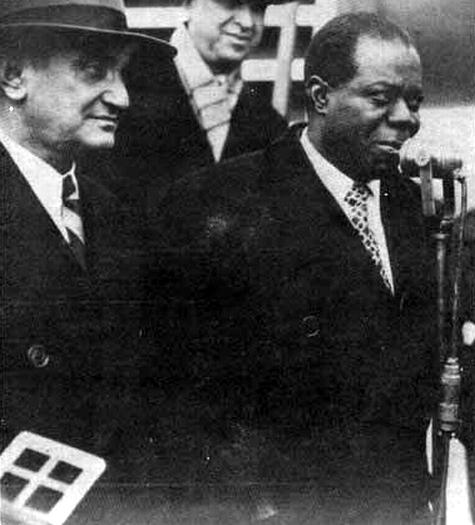 Regarding the last of these items, I have big news: if you’re going to be anywhere near Winter Park, Florida, on Tuesday night, you have a chance to come see the first forty minutes or so of Satchmo at the Waldorf, my one-man show about Louis Armstrong and Joe Glaser, his manager. Not only is this the plays first performance anywhere, but it’a also my debut as a theatrical director. The amazing Dennis Neal is playing Armstrong and Glaser. The performance is at Rollins College and admission is free.
Regarding the last of these items, I have big news: if you’re going to be anywhere near Winter Park, Florida, on Tuesday night, you have a chance to come see the first forty minutes or so of Satchmo at the Waldorf, my one-man show about Louis Armstrong and Joe Glaser, his manager. Not only is this the plays first performance anywhere, but it’a also my debut as a theatrical director. The amazing Dennis Neal is playing Armstrong and Glaser. The performance is at Rollins College and admission is free.
Here’s part of the press release:
Teachout started writing his first play, a one-man show based on Pops: A Life of Louis Armstrong, during his 2010 visit to the Winter Park Institute. Now Satchmo at the Waldorf is moving toward its first commercial production. In collaboration with the drama department of Rollins College, Teachout will present the first public performance of staged excerpts from Satchmo at the Waldorf and talk about the process of transforming a best-selling biography into a one-man play….
Go here for more details.
TT: Almanac
“Only the skilled can judge the skilfulness, but that is not the same as judging the value of the result.”
C.S. Lewis, A Preface to Paradise Lost
TT: To believe, or not to believe?
In today’s Wall Street Journal drama column, I review Palm Beach Dramaworks’ superb production of Freud’s Last Session. Here’s an excerpt.
* * *
In the cash-strapped but quality-conscious world of regional theater, a smart small-cast show about a famous personage of the past is about as close as you can get to a sure thing. It stands to reason, then, that Palm Beach Dramaworks, whose slogan is “Theatre to Think About,” should have rushed to put “Freud’s Last Session,” Mark St. Germain’s two-man play about an imaginary meeting between Sigmund Freud and C.S. Lewis, onto the tiny stage of its 84-seat theater. This show, which was originally developed in West Palm Beach, has since had highly successful runs Off Broadway, where it just reopened after a seven-week hiatus, and before that at Massachusetts’ Barrington Stage Company, where it received its official premiere two summers ago. Now that I’ve seen the Florida version, I know why: Mr. St. Germain has written one of the most stimulating plays of its kind to come my way.
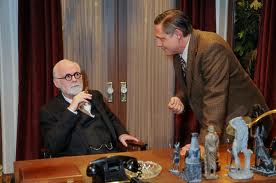 In “Freud’s Last Session,” Professor Lewis (Christopher Oden), the bluff Oxford don turned Christian apologist, pays a visit to the office of Dr. Freud (Dennis Creaghan), the religion-hating inventor of psychoanalysis, who has fled to London to escape Nazi persecution. What ensues is a cross between an urbane conversation piece and a knock-down-drag-out debate over the existence of God. Such plays often lack dramatic momentum, but this one is tautened by its shrewdly calculated setting. The date is September 3, 1939. Not long after Lewis arrives, Freud switches on the radio to hear Neville Chamberlain announcing that a state of war exists between England and Germany–and the air-raid sirens start to wail….
In “Freud’s Last Session,” Professor Lewis (Christopher Oden), the bluff Oxford don turned Christian apologist, pays a visit to the office of Dr. Freud (Dennis Creaghan), the religion-hating inventor of psychoanalysis, who has fled to London to escape Nazi persecution. What ensues is a cross between an urbane conversation piece and a knock-down-drag-out debate over the existence of God. Such plays often lack dramatic momentum, but this one is tautened by its shrewdly calculated setting. The date is September 3, 1939. Not long after Lewis arrives, Freud switches on the radio to hear Neville Chamberlain announcing that a state of war exists between England and Germany–and the air-raid sirens start to wail….
This production, which has been lucidly staged by William Hayes, the company’s artistic director, is a good example of Palm Beach Dramaworks’ brainy approach. The acting is sharp, sympathetic and detailed. Mr. Creighan has been made up to look exactly like Freud, and Michael Amico’s set is a fabulously precise evocation of the Viennese doctor’s cluttered consulting room, right down to the shawl on his clients’ couch. Even the BBC broadcasts sound believable. Yet nothing that we see or hear onstage is allowed to shift our attention from the play itself, and the fact that no one in the theater is more than a few feet from the stage makes you feel as though you’re part of the conversation….
* * *
Read the whole thing here.
The voice of Sigmund Freud, recorded by the BBC in 1938:
The voice of C.S. Lewis, recorded by the BBC in 1944:
